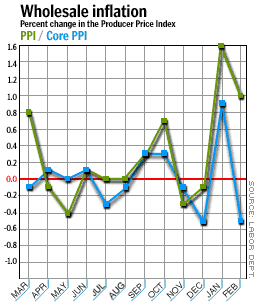NEW YORK (CNN/Money) -
Wholesale prices in the United States rose in February, driven by higher oil prices, the government said Friday, a bigger gain that economists had been expecting.
The Labor Department said its producer price index (PPI), a measure of wholesale prices, rose 1 percent after climbing 1.6 percent in January. The so-called core PPI, which excludes often volatile food and energy prices, fell 0.5 percent after rising 0.9 percent in January, the department said.

Economists, on average, expected a 0.7 percent gain in PPI and expected core PPI to be unchanged, according to a Reuters poll.
The report had little impact on Wall Street, where stocks ended mixed and Treasury bond prices also rose.
Inflation has been a distant memory in an economy that suffered through a recession in 2001 and a slow and sluggish recovery in 2002. In fact, some economists have been worried for some time about the possibility of deflation, when falling prices undercut corporate profits and lead to further economic weakness.
But while some goods-producing sectors have experienced deflation for several months, most prices have continued to climb, and Friday's PPI report indicates inflation could be weighing on corporate profit margins.
| Related stories
|

|
|
|
|
The worst pain was felt in energy prices, which rose 7.4 percent. Gasoline prices jumped 18.8-percent, and heating oil prices rose 25.2 percent.
The energy-price gain was the biggest since a 7.5-percent jump in October 1990, during the prelude to the first Gulf War. The gasoline-price gain was the biggest since a 25-percent jump in April 1999.
Oil prices have surged in recent months on a global crude-oil supply shortage and a "war premium" added to oil prices in anticipation of a U.S.-led war in Iraq.
Weighing down the "core" PPI number was a 0.6-percent drop in passenger car prices.

|

